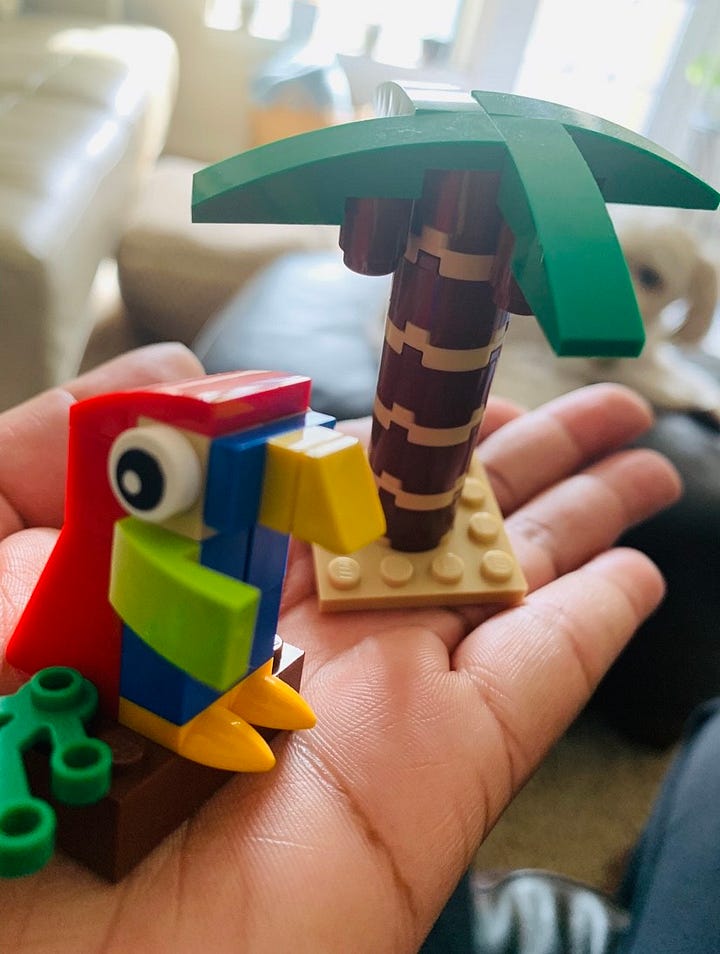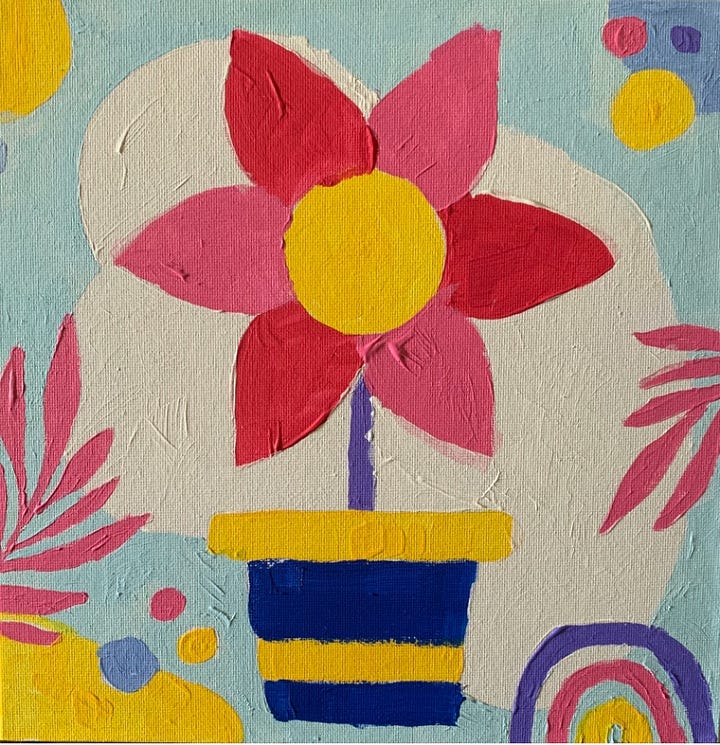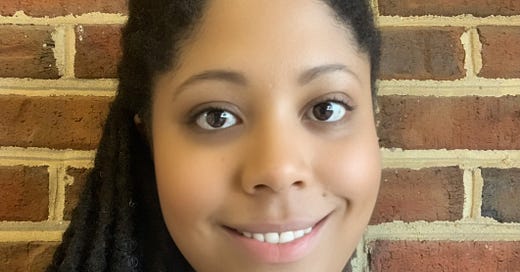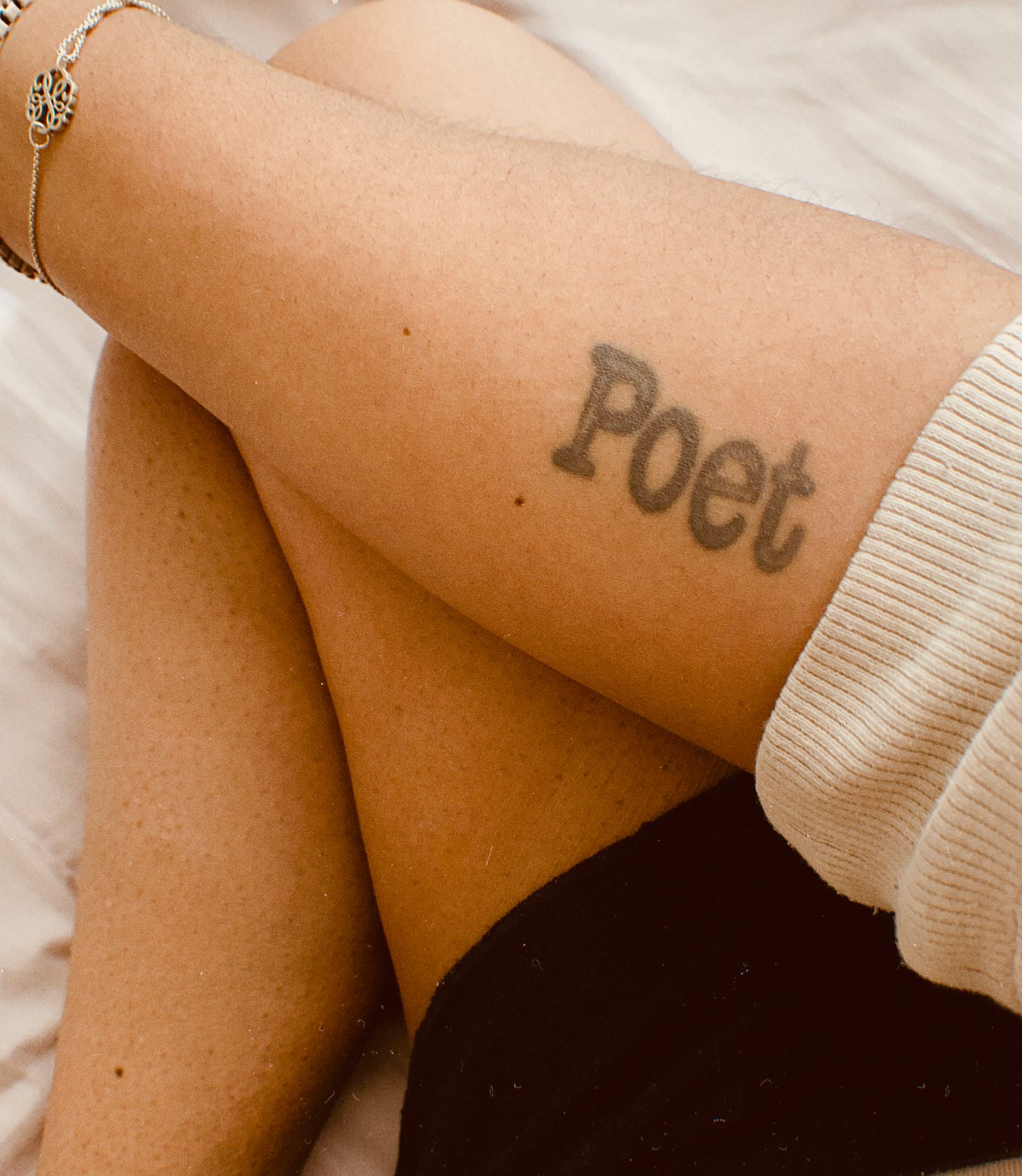Press Play ▶️ An Interview with Erica Dawson
"when I came back to books, it felt like so many authors writing about mental health were welcoming me home"
There’s a reader out there who is struggling with their mental health, with their creativity, with their identity. Maybe that reader is you. If you’re in a place where you need to take care of yourself, or you’re worried you might never make anything ever again once you’re well, this interview is tender and vulnerable and real, and it’s for you. You can thank Erica for it when you’re done reading her words (and don’t miss her poems linked at the end!) 💖
Explain yourself. Who are you, how do you identify as an artist / creative?
Hi there. I’m Erica. I’m a Black poet living with bipolar disorder and OCD. I’m interested in the intersections of mental illness and race. I’m equally fascinated by forms (in the Platonic and poetic sense) and football. I’m slow and steady. I’m ready for challenges. I’m here for not knowing. Right now I’m unable to work a full-time job. Staying well is my occupation.
I’m going to be honest: I’m a little nervous to answer these questions and revisit the most vulnerable time of my life. But reading an interview about having to take a break from my creative practice would have been such an anchor for me during my Long Pause. I’m hoping maybe I’ll be able to help someone else.
Editor’s Note: GOD, YES. Thank you for sharing.
You’re here because you’ve gone through a fallow period where you didn’t produce much work. How did your Long Pause come about? How long did it last?
My Long Pause came about during a massive and life-altering mental breakdown. In 2019, I felt like I was thriving. My latest book of poetry, When Rap Spoke Straight to God, was published the previous year. I was touring—everywhere from Portland to Portland. I was running a low-residency MFA program and working as a professor at home in Tampa.
And then I stopped sleeping. Paranoia set in. I’d spend hours hiding in my closet in the dark. Then I accidentally overdosed on a mood stabilizer and, out of fear, willingly went unmedicated for about a month. Without medication, the mania cycled into a depression deeper than I’d ever experienced before.
I was chronically suicidal. I could barely get out of bed or speak, let alone write. I lost my job. I had to move home with my mom. My whole world collapsed.
I didn’t write anything for almost three years. From the middle of 2020 to nearly 2023.
What about your creative practice feels like magic? What feels like science? Was one aspect more affected by your Long Pause?
Prior to 2019’s manic episode, so much about my creative practice felt like magic. I was a “when the mood strikes” kind of writer. And, I realize now, that mood was usually mania or hypomania. In that mood, everything is loud. Everything is big. Dramatic but fun. Writing felt somewhat out-of-body. As if the words-music-rhythms-energy were coming from something outside myself. Something bigger than myself. Something like a muse. And the poems came fast. Drafts came out relatively whole. Frenetic. Shiny. I worked diligently on my poems, obsessively at times, but writing felt smooth. There was an ease to it.
Now, after my Long Pause, that kind of magic is gone because the mania is mostly gone. (Thanks to a heavy dose of multiple medications.) The poems don’t feel like they’re coming to me. Now they’re already in me. I’m excavating them. I have to dig and drill and chisel them off of my bones. Each poem comes slowly, in pieces. Jagged. They have to be hewn. Writing feels much more intentional.
Also, I used to work almost exclusively with received forms, or at least a pretty regular meter. My new poems are somewhat freer. A bit messier.
I think there’s still a kind of magic, though. I’m here in this moment and I’m able to write. I’ve worked hard to get back here but, still, that’s magic.
How did your Long Pause change your creative practice? Has anything shifted in terms of process or medium?
My process has shifted greatly. There’s a lot more revision now. I used to be fairly wedded to my early drafts. I tried to stay pretty true to however a poem first came out. Close to that original impulse, that muse. Now, the first draft is truly a jumping off point. I’ll take a two page draft and, in the end, take away just one phrase. Then that phrase becomes the title of a totally different poem. I’m much more open to that kind of destruction and reinterpretation now. And I think my new poems are more open because of that. It feels as if there’s more air inside them. More room for me, and the reader, to roll around and live in the lines.
Were there positives that came out of your Long Pause? What did you learn or come to terms with while you were blocked?
This air, this openness, this newfound patience are the best things that came out of my Long Pause. I got out of my Long Pause by giving myself time to heal, which I could only do after learning how to be patient with myself. I mean, everything I thought I knew about myself had vanished. Being hardworking was at the core of my identity. Then, all of a sudden, I was unable to work. I had to come to terms with the fact that I really didn’t who I was outside of Poet/Professor/Dr. Dawson. I still don’t fully know her. But I’ve learned how to be ok with not knowing things. I’ve learned how to be ok with wonder. And ok with grief for what I’ve lost.
I’m writing now with that grief and about that grief, but not in an effort to leave it behind, rather to carry it with me.
Did you engage with other creative practices while you were blocked from your primary mode of expression?
In the deep depression, I felt like I’d lost all of my faculties. And electroconvulsive therapy left me unable to think the way I used to. I’m not quick on my feet in the same way. My memory is a mess. My cognition legitimately changed. During my Long Pause, everything in my life had to be simpler than it had ever been. So I learned how to play. I played with Legos. I colored. I did paint-by-numbers. I created collages. I learned how to be a novice. I learned, or am trying to learn, how to not push myself towards perfection. I’ve learned to appreciate the process of creativity, not just the production.


Did you attend any formal education to learn your craft? What, if anything, did you learn in that context about blocks or pauses?
I have an MFA and a PhD and, honestly, I didn’t learn much in these contexts about blocks or pauses. My memory often fails me these days, but I can’t remember any teacher or mentor really addressing even the possibility of a Long Pause. When I find myself in teaching opportunities, I hope I can let students know that, even if they can’t find their creativity or access it in the ways they used to, they can learn a new creative self.
What have you read / watched / seen that has been helpful for you and your creativity? Any books or media to recommend? What felt inspiring or comforting or interesting?
I had a Long Pause from reading during the same time as my Long Pause from writing. But when I came back to books, it felt like so many authors writing about mental health were welcoming me home. Kay Redfield Jamison. Ellen Forney. Bassey Ikpi. Anne Sexton. What a great little family we are. As I came back from my Long Pause, I listened to a lot of Iron & Wine and Fiona Apple and other artists who, for me, confront sadness and trauma head-on. And I watched a shit ton of PBS. Cooking and travel shows. Things that were instructional or curious felt comforting.
Check out these titles from Erica’s recommended authors on Bookshop!
Erica Dawson is the author of three books of poetry: When Rap Spoke Straight to God (Tin House, 2018), winner of the 2018 Florida Book Awards Gold Medal for Poetry; The Small Blades Hurt (Measure Press, 2014), winner of the 2016 Poets’ Prize; and, Big-Eyed Afraid (Waywiser Press, 2007), winner of the 2006 Anthony Hecht Prize.
Her poems have appeared in Blackbird, Revel, Shō Poetry Journal, The Believer, Virginia Quarterly Review, and other journals. Her poems have appeared in several anthologies, including Best American Poetry 2008, 2012, and 2015, Resistance, Rebellion, Life: 50 Poets Now, and American Society: What Poets See. Her prose has appeared in The Rumpus. She has been featured on PBS Newshour, and in The New York Times Magazine, and O, The Oprah Magazine.
Erica holds a BA from Johns Hopkins University, an MFA from Ohio State University, and a PhD from University of Cincinnati. She’s taught workshops and seminars at the Tin House Workshop, the Florida Literary Arts Coalition’s Other Words Conference, St. Leo University’s Sandhill Writers Retreat, and the DISQUIET International Literary Program in Lisbon. She was an associate professor at the University of Tampa.
She lives in the Baltimore-DC area with her Shih-Tzu, Stella, whom she named after Sir Philip Sidney’s Astrophil and Stella, not Tennessee Williams’ Stella or Stella Artois, though Erica really likes Tennessee Williams and Stella Artois.
You can find Erica and her books at www.ericadawsonpoet.net.
You can also find her on Instagram.
Recent Pubs:
“Five Poems by Erica Dawson”
https://oneartpoetry.com/2025/02/01/five-poems-by-erica-dawson/
“Portrait of the artist as sonnet for Dickinson’s line A wounded deer – leaps highest —”
https://shopoetryjournal.com/audio-feature-erica-dawson/
“Sonnet after autocorrect turns why do you live so far away to why do you love so far away?”
https://thesoundofsugar.blogspot.com/2024/12/erica-dawsonsonnet-after-autocorrect.html
“Remedy”
https://www.rogueagentjournal.com/edawson
“Due”
https://www.mudroommag.com/erica-dawson
“Delusion”
https://revel-literary.com/excerpts






